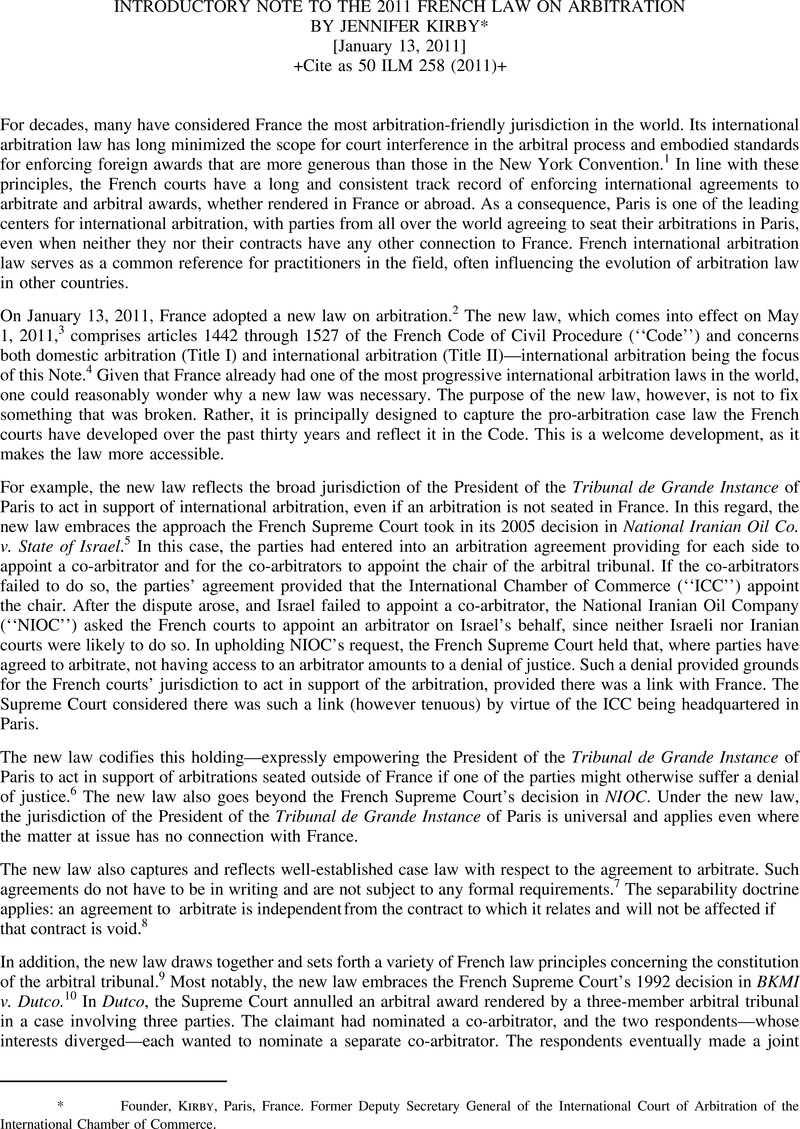No CrossRef data available.
Article contents
The 2011 French Law on Arbitration
Published online by Cambridge University Press: 27 February 2017
Abstract

- Type
- International Legal Documents
- Information
- Copyright
- Copyright © American Society of International Law 2011
References
Notes
* This text was reproduced and reformatted from the text available at the Official Journal of France website (visited Mar. 30, 2011) http://www.legifrance.gouv.fr/jopdf/common/jo_pdf.jsp?numJO=0&dateJO=20110114&numTexte=9&pageDebut=00777&pageFin=00781#.
1 Convention on the Recognition and Enforcement of Foreign Arbitral Awards of 1958, June 10, 1958 Google Scholar, 330 U.N.T.S. 38, available at http://treaties.un.org/doc/Publication/UNTS/Volume%20330/volume-330-I-4739-English.pdf.
2 Decree No. 2011-48 of January 13, 2001, available at http://www.iaiparis.com/pdf/FRENCH_LAW_ON_ARBITRATION.pdf [hereinafter Decree].
3 Certain provisions of the new law only apply to agreements to arbitrate concluded after May 1, 2011. Similarly, other provisions only apply to awards issued, or arbitral tribunals constituted, after that same date. See id. art. 3.
4 See Emmanuel, Gaillard &Pierre de, Lapasse, Le nouveau droit français de l’arbitrage interne et international , in Etudes et Commentaires/Chroniques/Arbitrage (Recueil, Dalloz, Jan. 20, 2011)Google Scholar (providing a detailed commentary (in French) on both the domestic and international arbitration provisions of the new law).
5 Cour de cassation [Cass.] [supreme court for judicial matters], 1ère civ., Feb. 1, 2005, Bull. civ. No. 404, Israel v. NIOC, 2005, Bull. civ. I, No. 53, at 45 (Fr.).
6 Decree, supra note 2, art. 1505(4).
7 Id. art. 1507.
8 Id. art. 1447. Although Article 1447 is part of Title I on domestic arbitration, Article 1506(1) provides that it shall apply to international arbitration as well. For details on all the provisions of the domestic French arbitration law that also apply in international arbitration, see Article 1506.
9 Id. arts. 1452-58 (applicable to international arbitration by virtue of Article 1506(2)).
10 Cour de cassation [Cass.] [supreme court for judicial matters], Jan. 7, 1992, Bull. civ. I, No. 2 (Fr.).
11 See, e.g., Rules of Arbitration, art. 10, Int’l Chamber of Com., available at http://www.iccwbo.org/uploadedFiles/Court/Arbitration/other/rules_arb_english.pdf; Arbitration Rules, art. 13, Stockholm Chamber of Com., available at http://www.sccinstitute.com/skiljedomsregler-4.aspx; Arbitration Rules of the Singapore International Centre, rule 9, Singapore Int’l Centre, available at http://www.siac.org.sg/cms/index.php?option=com_content&view=article&id=210&Itemid=130 Google Scholar.
12 Decree, supra note 2, art. 1453.
13 Id. art. 1468 (applicable to international arbitration by virtue of Article 1506(3)).
14 Id. art. 1449 (applicable to international arbitration by virtue of Article 1506(1)). The arbitral tribunal is constituted when all arbitrators have accepted their mandate. Id. art. 1456 (applicable to international arbitration by virtue of Article 1506(2)).
15 Id. art. 1526.
16 See old French Arbitration Law, arts. 1479, 1506, available at http://www.iaiparis.com/lois_en.asp.
17 Decree, supra note 2, art. 1522.
18 See Denis, Bensaude, French Code of Civil Procedure , in Concise International Arbitration 896 (Loukas, A. Mistelis ed., 2010)Google Scholar.
19 PIL, art. 192; see also Code Judiciaire art. 1717(4), May 19, 1998 (Belg.), available at http://www.jus.uio.no/lm/belgium.-code.judicature.1998/toc.html (inspiring the Swiss law on exclusion agreements).
20 Decree, supra note 2, arts. 1520, 1522.
21 Id. art. 1464.
* Translated by Emmanuel Gaillard, Nanou Leleu-Knobil, and Daniela Pellarini of Shearman & Sterling LLP. Thanks go to Charles Kaplan of Herbert Smith LLP for his valuable comments.
1 Articles or paragraphs preceded by three asterisks (***) also apply to international arbitration.
2 Article 145 provides as follows: If, before legal proceedings commence, there is a legitimate reason to preserve or establish evidence upon which the resolution of a dispute may depend, measures relating to the taking of evidence may be ordered, upon the request of any concerned party, by way of a petition to a court or expedited proceedings.
3 Article 595 provides as follows:
An application for revision of a judgment may be made only where:
-
1.
1. it comes to light, after the judgment is handed down, that it was obtained fraudulently by the party in whose favour it was rendered;
-
2.
2. decisive evidence that had been withheld by another party is recovered after the judgment was handed down;
-
3.
3. the judgment is based on documents that have since been proven or have been held by a court to be false;
-
4.
4. the judgment is based on affidavits, testimonies or oaths that have been held by a court to be false.
In all four cases, an application for revision shall be admissible only where the applicant was not able, through no fault of his or her own, to raise such objection before the judgment became res judicata.
4 Opposition is a form of recourse under French law, available when a judgment is rendered by default because a defendant was not properly notified of a hearing. The defendant can then “oppose” the judgment.


